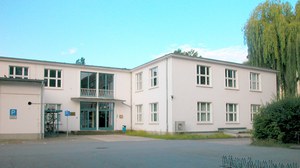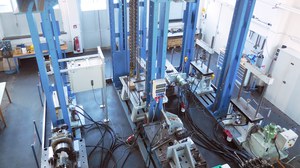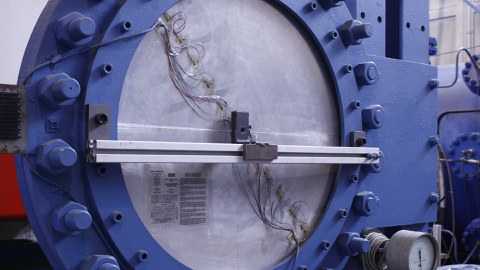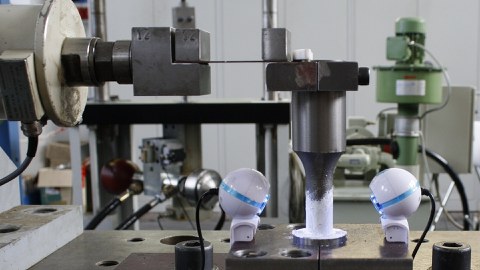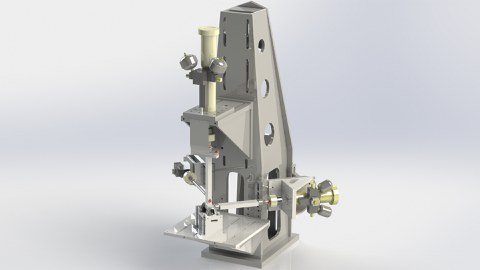Arbeitsgebiete der Arbeitsgruppe Betriebsfestigkeit
Die Arbeitsgruppe Betriebsfestigkeit stellt eine Struktureinheit des Instituts für Festkörpermechanik der TU Dresden dar und ist seit 2022 Teil der Professur für Numerische und Experimentelle Festkörpermechanik.
Lehr-, Forschungs- und Kooperationstätigkeiten konzentrieren sich dabei auf den Bereich der Schwing- & Betriebsfestigkeit von Werkstoffen, Bauteilen und Komponenten.
Sowohl in theoretischen Arbeiten als auch experimentellen Untersuchungen wird an diesem Themenkomplex und verwandten Forschungsfeldern wie der experimentellen Festkörpermechanik geforscht und gelehrt.
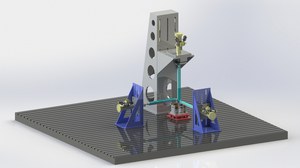 © AG Betriebsfestigkeit
© AG Betriebsfestigkeit
Arbeitsgebiete der Arbeitsgruppe Betriebsfestigkeit
Als Struktureinheit der TU Dresden gliedert sich das Aufgabengebiet der Fachgruppe Betriebsfestigkeit der Professur für Numerische und Experimentelle Festkörpermechanik (NEFM) in die studentische Ausbildung und die wissenschaftliche Forschung. Zur Wahrnehmung und Verknüpfung dieser beiden Bereiche spielen Kooperationen eine entscheidende Rolle.
Betriebs- und Schwingfestigkeit spielen im Alltag des Ingenieurs eine entscheidende Rolle. Eine Einschätzung zur Festigkeit dynamisch beanspruchter Bauteile ist für viele Maschinen, (Luft-)Fahrzeuge und Anlagen essentiell und somit grundlegendes Lehrfach im Studiengang Maschinenbau. Anwendung findet das vermittelte Wissen dann nicht nur in Forschung & Entwicklung sondern ebenfalls in der Konstruktion oder dem Versuch. Im Fach Betriebsfestigkeit oder weiter vertiefend der Ermüdungs- und Betriebsfestigkeit werden die erforderlichen Grundlagen gelehrt, welche eine individuelle fallspezifische Spezialisierung ermöglichen und ein weitgehendes Verständnis existierender Regelwerke vermitteln.
Die Experimentelle Festkörpermechanik vermittelt Einblicke in praxisrelevante experimentelle Methoden. Sie bildet damit eine hervorragende Ergänzung zu den numerischen Simulationsmethoden im Maschinenbau und sensibilisiert Studenten zum kritischen Umgang mit Messdaten, Rechen- und Simulationsergebnissen.
Die Grundlagenfächer der Technischen Mechanik sind allgemeine Voraussetzung zum Verständnis mechanischer Problemstellungen und werden am Institut für Festkörpermechanik für verschiedenen Ingenieursstudiengänge angeboten.
Forschungen im Bereich der Betriebsfestigkeit konzentrieren sich sowohl auf den rechnerischen als auch den experimentellen Lebensdauernachweis.
Arbeiten zum rechnerischen Nachweis untersuchen dabei nicht nur neue Werkstoffe und Berechnungsmethoden sondern liefern auch Beiträge zur Verbesserung und Erweiterung bestehender Regelwerke. Beim experimentellen Lebensdauernachweis werden Verfahren zur Werkstoff- und Bauteilprüfung entwickelt und untersucht, um spezifischen Ermüdungsphänomenen angemessene Prüfmethoden entgegenzustellen.
Kooperationen und fachlicher Austausch bestehen im Fachgebiet der Betriebsfestigkeit sowohl innerhalb der TU Dresden als auch mit externen Forschungsstellen und Industriepartnern. Dabei ergänzen sich infolge der stark interdisziplinär geprägten Wissenschaft oft fachübergreifende Betrachtungen zu praxistauglichen Problemlösungen und wissenschaftlicher Weiterentwicklung.

